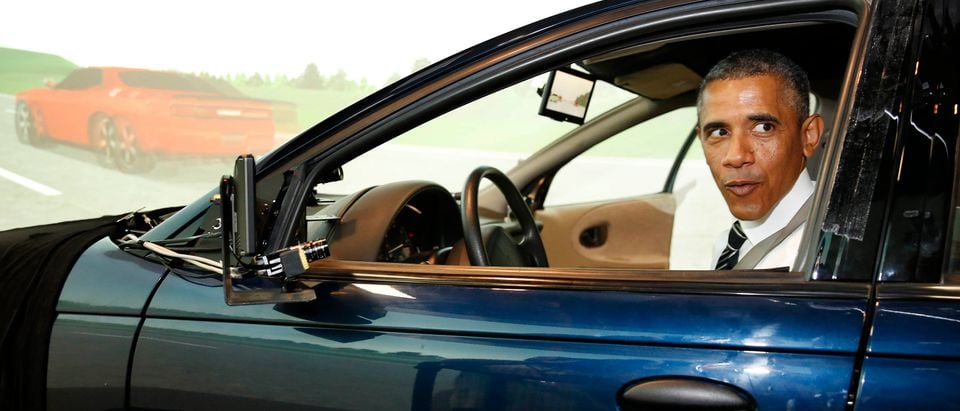The White House, Democrats and California are locked in a high-stakes battle over the future of auto industry fuel economy regulations that were put in place to slow man-made global warming.
The Trump administration will soon unveil plans to roll back Obama-era regulations on light duty cars and trucks. The Obama administration in 2012 issued regulations to limit carbon dioxide emissions from new cars, effectively mandating new vehicles get around 54.5 miles per gallon by 2025.
Obama administration officials also gave California the authority to set its own auto emissions standards, which many other states now follow. Trump is expected to freeze auto standards at 2020 levels and take away California’s authority on the matter as well. Democrats and California Gov. Jerry Brown have vowed to fight any rollback of climate regulations on the auto industry.
But with billions of dollars on the line, what effect do Obama-era regulations actually have on the climate? The answer: likely nothing.
The New York Times obtained a draft of the Trump administration’s proposal that shows rolling back Obama-era fuel economy rules would only increase global average temperature “3/1,000ths of a degree Celsius” by the end of the century.
Repealing the Obama-era standards would have an effect on the amount of carbon dioxide in the atmosphere that’s “too small to measure in practice,” according to the draft proposal. Officials estimate “an 8/10,000th of a percentage increase” in CO2 concentrations by 2100.
“Compared to maintaining the post-2020 standards set forth in 2012, today’s proposal would reduce societal costs by about half a trillion dollars and reduce highway fatalities by up to a thousand lives annually,” reads the draft proposal prepared by Transportation Department and Environmental Protection Agency officials.
“U.S. fuel consumption would increase by about half a million barrels per day, but would only negligibly impact the global climate,” reads the draft proposal. (RELATED: NY Times Magazine Will Dedicate Its Entire Next Issue To Global Warming)
The Obama administration’s own regulatory analysis made similar findings in regard to stricter fuel economy standards’ effects on Earth’s climate.
“The projected reductions are small relative to the overall expected increase in temperature and sea level rise projected by the baseline GCAM reference case simulated” by climate models, reads the EPA’s 2012 analysis of auto standards.
“However, this is to be expected given the magnitude of emissions reductions expected from the rule in the context of global emissions,” EPA argued at the time.
The Obama administration also argued climate regulations would add $1,800 to the cost of a new car by 2020, but save consumers up to $7,400 in lower fuel costs through increased mileage. Those estimates, however, are based on gas prices averaging $3.87 a gallon.
Trump administration officials will likely agree that auto standards raise new car prices, but will disagree with the effect of making vehicles more expensive.
“As prices increase, keeping an existing used vehicle or purchasing a used vehicle becomes more attractive,” officials wrote in the draft proposal.
“And while new vehicle sales have been healthy in absolute numbers over the past several years, much of this was attributable to pent up demand from delayed vehicle purchases during the recession,” they wrote. “Even taking these numbers into account, the United States has seen a gradual and persistent decline in new vehicle purchases on a per capita basis since a peak in 1986.”
Follow Michael on Facebook and Twitter
All content created by the Daily Caller News Foundation, an independent and nonpartisan newswire service, is available without charge to any legitimate news publisher that can provide a large audience. All republished articles must include our logo, our reporter’s byline and their DCNF affiliation. For any questions about our guidelines or partnering with us, please contact licensing@dailycallernewsfoundation.org.












